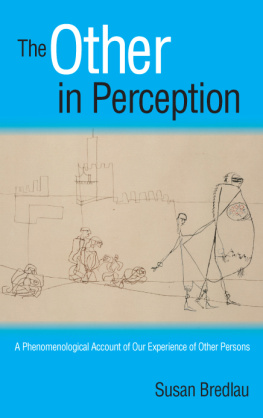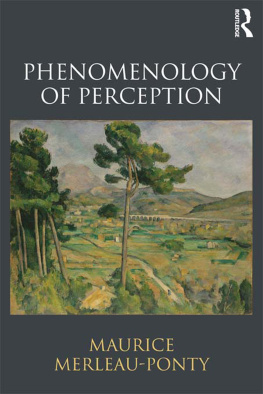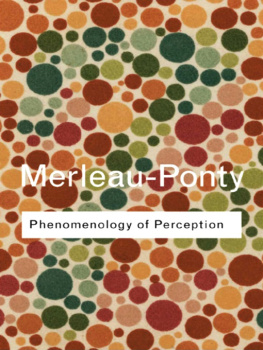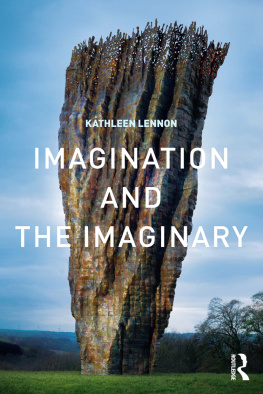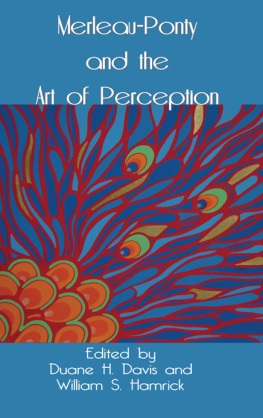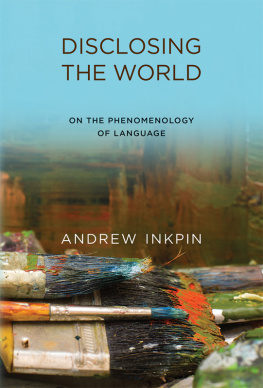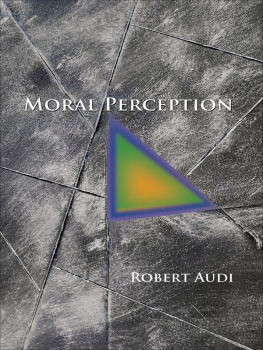The Other in Perception
A Phenomenological Account of Our Experience of Other Persons
Susan Bredlau
Cover image: Paul Klee, Episode B at Kairouan (1931). Ink on paper mounted on cardboard. The Berggruen Klee Collection, 1984. 2018 Artists Rights Society (ARS), New York.
Published by State University of New York Press, Albany
2018 State University of New York
All rights reserved
Printed in the United States of America
No part of this book may be used or reproduced in any manner whatsoever without written permission. No part of this book may be stored in a retrieval system or transmitted in any form or by any means including electronic, electrostatic, magnetic tape, mechanical, photocopying, recording, or otherwise without the prior permission in writing of the publisher.
For information, contact State University of New York Press, Albany, NY
www.sunypress.edu
Library of Congress Cataloging-in-Publication Data
Names: Bredlau, Susan, author.
Title: The other in perception : a phenomenological account of our experience of other persons / Susan Bredlau.
Description: Albany : State University of New York Press, [2018] | Includes bibliographical references and index.
Identifiers: LCCN 2017058929 | ISBN 9781438471716 (hardcover : alk. paper) | ISBN 9781438471730 (ebook)
Subjects: LCSH: Merleau-Ponty, Maurice, 19081961. Phnomnologie de la perception. | Phenomenology. | Perception (Philosophy) | Other (Philosophy)
Classification: LCC B829.5 .B686 2018 | DDC 121/.34dc23
LC record available at https://lccn.loc.gov/2017058929
10 9 8 7 6 5 4 3 2 1
To my father, Carl Bredlau.
He took delight in learning and taught me to do the same.
Contents
Acknowledgments
I am deeply grateful to the many people through whom I have become more attentive to and articulate about the rich significance of our experience. These relationships have had a profound impact on my writing of this book and on my life as a whole. I especially want to thank John Russon, whose encouragement and wise counsel have been, and continue to be, a vital presence in my world. I also want to thank Ed Casey, Kirsten Jacobson, Peter Manchester, Kym Maclaren, Donn Welton, Cynthia Willett, John Lysaker, John Stuhr, Laura McMahon, Whitney Howell, the anonymous reviewers for SUNY Press, Greg Kirk, Scott Marratto, David Morris, Don Beith, Michael Cox, David Ciavatta, Peter Costello, Joe Arel, Patricia Fagan, John Garner, Steve Arcas, Eve Rabinoff, Eric Sanday, Rachel Calef, Greg Recco, Christopher Rolling, Karen Robertson, Carly Yasinski, Jenny Chio, mer Aygn, John Tielli, Rhett Henry, Maria Talero, Alexa Cucopulos, Nathan Anderson, Chris Gale, Miles Rosenthal, Kerry Thompson, Jason Matteson, Bruce Gilbert, Janet Bredlau, Liz Bredlau, Jason Strawsburg, Amiere Strawsburg-Bredlau, and Ryan Strawsburg-Bredlau.
An earlier version of portions of
A Note on Citations
For Merleau-Pontys Phenomenology of Perception , which is the focal text of this study, all citations will refer to Phnomenologie de la Perception , published by Gallimard in 2005 and to the translation by Donald A. Landes, published by Routledge in 2012. The page number of the French text is listed first, followed by the English page number.
Introduction
We do not usually think of perception as an interpersonally significant activity. That is, while we certainly recognize that other people are included in the world we perceive, we do not tend to think of them as included in the act of perception itself. Indeed, we tend to distinguish our perception of the world from our relationships with other people. We often assume that perception is effected individually and that our perceptions, unlike attitudes such as trust that are generated in our interactions with other people, offer us a consistent and impartial representation of the world. Yet, I will argue, such a sharp separation between our perception of the world and our relationships with other people is not tenable. Our relationships with other people deeply inform our perception of the world and, indeed, constitute our perception of the world as a shared world. In short, we are always dealing with other people, whether we notice this explicitly or not.
To grasp the role of others in our experience, we must first get clear on how we experience others: it is this distinctive character of our awareness of others that we will investigate. To do this, though, we must first address the very notion of an awareness of others, for this notion seems to harbor within it a contradiction: another person is not a simple object of perception like a tree or a book, for another person is precisely an other an individual who, in her own nature, holds her distinctive reality apart from herself. For that reason, though, others are an epistemological mystery, for the very nature of being another subject seems to entail an inherent privacy to what it is to be that personan inherently inner lifeand thus something that, by definition, would escape our (external) perception. Indeed, it has often seemed to theorists that others cannot be known, hence the so-called problem of other minds: from the outside, it seems, we could never get to the inside. On the face of it, then, awareness of others does not even seem possible.
In Being and Time , however, the twentieth-century phenomenologist Martin Heidegger argues, on the contrary, that our experienceindeed, our very being is always a being-with-others. Being-with is not, in other words, characteristic of some of our experiences: those, for example, in which we are explicitly aware of another person or persons. Rather, being-with is characteristic of all our experiences. Thus, I can, for example, be alone and yet feel very connected with others, and I can be surrounded by others and yet feel lonely. Regardless of whether other people are directly present to us, other people are indirectly present to us in the meaning that whatever is directly present to us has. The way I dress myself in the morning, the way I walk down the street, and the way I eat my lunch reflect my implicit awareness of others. When we turn to our own experience, it is clear that others are in fact always present to us; indeed, the very fact that the problem of other minds makes sense to us indicates that we clearly live with a sense of what an other mind would be.
This, then, will be our task: to turn to the nature of our experience in order to define more precisely how other people are present in our perceptual life. This is both a theoretical matteraddressing the issue in principle of whether and how awareness of others is possibleand an empirical matteraddressing the concrete, specific ways in which others show up in our experience. What our study will ultimately show is that, far from being a kind of reality inherently excluded from our experience, other people will prove to be right there at the most intimate heart of our experience. Other people, we shall see, shape the very way we have a perceptual life at all.
This work is a study on and within the philosophical tradition of phenomenology. Phenomenology is primarily a philosophical method: the description of experience. This method was introduced by Edmund Husserl in the early twentieth century, as I explain in phenomenological project introduced by Husserl and Merleau-Ponty into concrete studies of personal and interpersonal life. These three figuresHusserl, Merleau-Ponty, and Russonoffer a progressively deeper grasp of the character and meaning of our experience, especially as it relates to our experience of other people. Specifically, they demonstrate that the explicit objects of our experience that we typically imagine to be what our experience is about have the meaning that they do because they are contextualized by many layers of bodily and temporal meaninglayers of meaning that are not explicit in our perception. The description of experience, therefore, is not a simple listing of the obvious features of our experience, but it is a deeply self-critical probing that ultimately cannot be separated from behavioral transformation.

